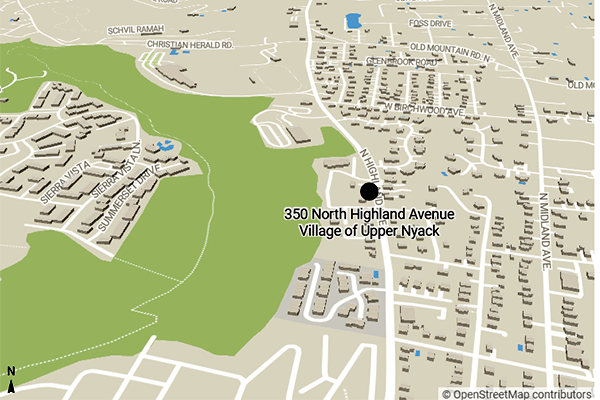|
RCBJ-Audible (Listen For Free)
|
Application For Special Permit Is Pending Before The Upper Nyack Planning Board To Convert Former Alliance Theological Seminary To A Jewish Day School
The New York State Attorney General’s Office’s Charities Bureau has approved Yeshiva Viznitz Dkhal Torath Chaim Inc.’s (Viznitz) sale of 350-360 North Highland Avenue in Upper Nyack to Nyack Building, LLC, an entity controlled, according to the AG’s Office, by Joseph Berlin.
The sale price for the 36-acre property is $6.5 million.
The property, the former location of the Alliance Theological Seminary, was acquired by Viznitz when it purchased the 107-acre Nyack College Campus in South Nyack in 2020 for $45.5 million.
Attorney General approval is necessary when a charitable or religious organization sells a substantial piece of property. The approval process ensures that transactions are arms-length, and that the property trades for its fair market value. An independent appraisal must be submitted to the AG’s office along with a petition approving the sale.
One consideration in the approval process is whether the sale is unusually complex or will have an impact on the public. A religious or nonprofit organization can alternatively ask a court to approve the transaction.
At the same time Viznitz sought AG approval for the sale, it was also seeking a Special Permit from the Village of Upper Nyack to convert the for the former seminary building to a Jewish Day School for 440 students and 90 staff. The school would be operated by Spring Valley-based Congregation Ramapo Cheder, and provide education six days a week (Sunday through Friday), serve breakfast to students, and close for Jewish holidays and summer recess.
Ramapo Cheder and Viznitz have applied to the Village for a Site Plan approval and Special Permit to operate the school. The property spans 36 acres, 15 of which are located in the Town of Clarkstown. In Upper Nyack, the property straddles two zoning districts, the OB (Office/business) and the R-80 (Conservation) zones. A search of the applications make no mention of Nyack Building, LLC.
Because of the nature of the application — reuse of an existing building — there is limited environmental review available under New York’s State Environmental Review Act (SEQRA).
The plan calls for some exterior upgrades to the existing building and an interior renovation of the 57,000 square foot, two story building to accommodate use as a day school.
The application says its prior 50-year use as an educational facility, its proximity to Nyack High School, the existing infrastructure make it eligible for a Special Permit, particularly when compared to other potential permitted uses for the site, which the applicant avers would be more intensive than the operation of the day school.
According to the Attorney General, the net proceeds from the sale will be used to pay off two private loans taken to pay for renovations at 1 and 31 South Broadway in South Nyack on the Viznitz campus, the former Nyack College campus. Any remaining funds will be used to pay off a business line of credit at Webster Bank.
The purchase of Nyack College in 2020 instigated public upheaval, inadvertently leading to the 144-year-old Village of South Nyack dissolving and becoming part of the Town of Orangetown. Fear over future development on the 107-acre former Nyack College campus, and the potential cost of fighting land-use lawsuits, ultimately swung many of the village’s 1,982 registered voters to break with their long heritage in favor of gaining the financial muscle of Orangetown.
Not long after, Viznitz applied to the Village of Upper Nyack for a Special Permit to operate a college at the former seminary complex for religious Jewish education for 250 college students, a use Viznitz characterized as identical to the previous use when the building was owned by Nyack College. However, a pandemic-related building moratorium in place at the time prevented the application from being reviewed. In September 2021, Viznitz sought an exemption from the moratorium, claiming it the group from operating its school and violated its free exercise of religion.
At a recent Planning Board meeting, concerns were raised by local residents about traffic and school buses on Route 9W in proximity to Nyack High School which already generates student, staff and bus traffic. The applicant was tasked to provide a traffic study addressing these issues, and the Planning Board has retained an independent traffic engineering consultant (Stonefield Engineering) to review the applicant’s study and its conclusions.
Both New York State and federal law (RLUIPA) requires municipalities to be flexible in the application of their zoning code to educational and religious uses. These laws generally apply to Special Permits and variances.
Because part of the parcel sits in the Town of Clarkstown, it must also have an opportunity to review the application. And because the property borders the Village of Nyack, it will also have an opportunity to weigh-in on the impacts to Nyack.
The next Planning Board meeting in the Village of Upper Nyack is scheduled for June 18 at 6 pm.
Viznitz closed on the property in 2020. The Upper Nyack former seminary building has sat vacant since being acquired.
















